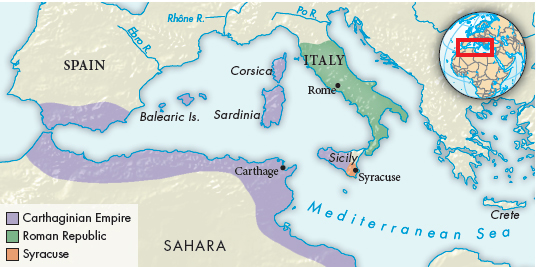Understanding World Societies:
Printed Page 152
Overseas Conquests and the Punic Wars, 264–133 B.C.E.
The Romans did not map out grandiose strategies to conquer the world. Rather they responded to situations as they arose. This meant that they sought to eliminate any state they saw as a military threat.
Their presence in southern Italy brought the Romans to the island of Sicily, where they confronted another great power in the western Mediterranean, Carthage (CAHR-
The conflicting ambitions of the Romans and Carthaginians led to the first of the three Punic Wars. During the course of the first war, which lasted from 264 B.C.E. to 241 B.C.E., Rome built a navy and defeated Carthage in a series of sea battles. Sicily became Rome’s first province, but despite a peace treaty, the conflict was not over.

Carthaginian armies moved into Spain, where Rome was also claiming territory. The brilliant Carthaginian general Hannibal (ca. 247–
The Roman general Scipio Africanus (ca. 236–
The Second Punic War contained the seeds of still other wars. Unabated fear of Carthage led to the Third Punic War (149–
After the Second Punic War, the Romans turned east. Roman victory in Macedonia turned Antigonid Macedonia into a Roman province. Then they moved farther east and defeated the Seleucid monarchy. In 133 B.C.E. the king of Pergamum in Asia Minor willed his kingdom to Rome when he died. The Ptolemies of Egypt retained formal control of their kingdom, but they obeyed Roman wishes in terms of trade policy. Declaring the Mediterranean mare nostrum, “our sea,” the Romans began to create a political and administrative machinery to hold the Mediterranean together under a system of provinces ruled by governors sent from Rome.